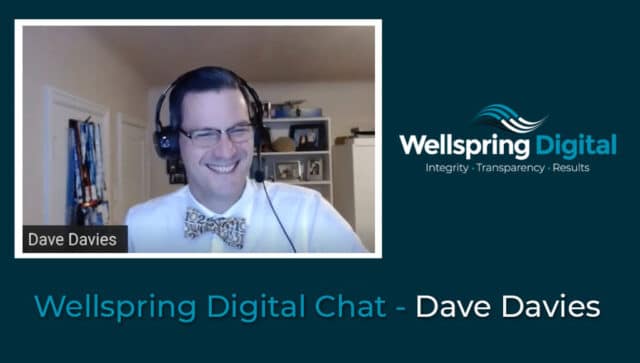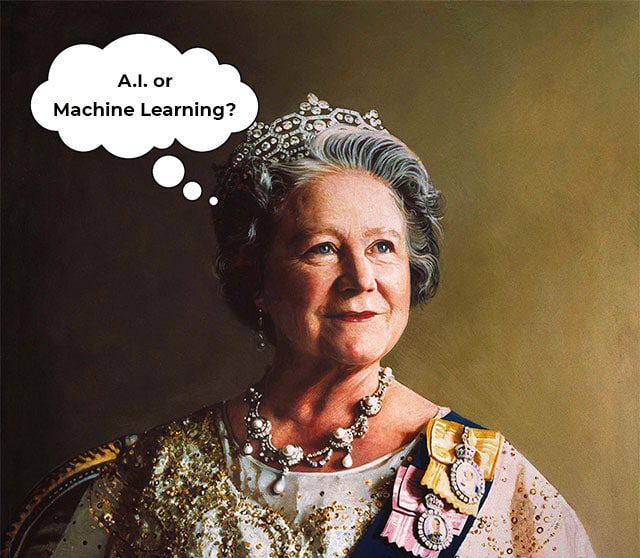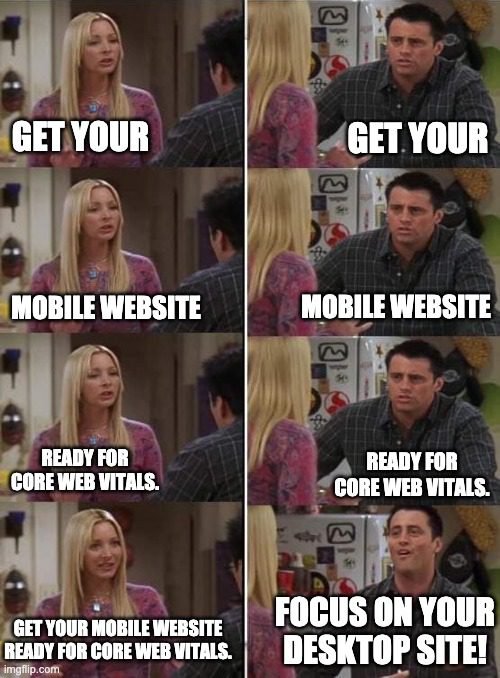That title does not do Dave justice because he is so much more than that. In addition to breaking down SEO with Jim Hedger on Webcology for over 15 years, he is also a frequent contributor to Search Engine Journal and other popular SEO pubs, and one of the smartest technical SEOs out there.

I promise we won’t go too far down the geek rabbit hole. There is some really good stuff in here, even for the non-SEO marketer. In this, Dave and I discuss…
- Google E-A-T and its impact on Google algorithms
- What is a modern search demand?
- Humans checking Google’s AI
- Is Google pushing for a better CMS?
- Is user experience the bottom line for SEO?
Let’s get into it!
Digital Transcription (Edited for Readability)
Introductions
Jon-Mikel Bailey: Hi, I’m Jon-Mikel Bailey, and welcome to the Wellspring Digital Chat where we interview marketing experts. This is usually where I say something goofy about, we go and kidnap them and dissect their brains and all that stuff. But today, we have a Canadian and he’s serious, and I don’t want to stay serious. So, we’re gonna keep it really serious.
So in the interest of seriousness, what we did was, we hired a seal team to storm his house at night. And they hooked up a chip in the back of his brain. And so we’re going to be tracking all of his thoughts during this interview, and then we’ll retrieve the chip, he won’t know. I don’t think he can hear me right now. So we’re fine.

So anyway, today we have one of the best SEO brains out there. Even if he is from Canadia. Dave Davies, no, not the fresh air co-host who I love. But my other favorite Dave Davies is co-host of the Webcology podcast with a Wellspring Digital Chat alum, Jim Hedger. He has some of the best and most useful, useful content out there on SEO and today he is all ours. So Dave, please take a moment and tell these fine folks aboot yourself.
Dave Davies: Well, I’ve been doing SEO for going on about 20 years now. So yeah, I’ve been doing it a while. I’m actually… my co-host, a fact that a lot of people don’t know, worked for the company that I got my start with, he was there a couple of years ahead of me.
Jon-Mikel Bailey: See, I knew that.
Dave Davies: And so I actually learned a lot of my initial sort of foundation from Jim Hedger, my now co-host. I’m the CEO of Beanstock Internet Marketing and the I’m excited about some of the topics we’re gonna be covering because I’m also the lead SEO for Weights & Biases machine learning operations tool manufacturer, so super excited about some of the stuff we’ll be chatting about today.
Jon-Mikel Bailey: Awesome. So quick question. Do you prefer the younger, more hip, you know, earring, Jim Hedger or the older, more distinguished, you know, gentlemanly Jim Hedger. I have my preference.
Dave Davies: Yeah, I’ve liked him always. But like, we haven’t been friends since pretty much we first sort of map but yeah, I find it easier to chat with the version of Jim, I talk to every week today.
Jon-Mikel Bailey: There you go. I like that answer. That was a great answer. So I love picking the brains of OG SEOs. We have one here at Wellspring who, who is also a little nuts. But I think you all are. But today it’s your turn, Dave. So you ready to get our hands dirty with some SEO?
Dave Davies: Let’s do it.
Jon-Mikel Bailey: Let’s do this.
Google E-A-T and Its Impact on Google Algorithms
Jon-Mikel Bailey: Alright, so first, right out of the gates. I want to talk about Google E-A-T and the quality raters guideline. You have a line in your chapter of the recent Search Engine Journal ebook, which I love, which I think speaks volumes to the line is, I’m gonna read this, the line is “the quality raters don’t influence the rankings of the sites, they influence the rankings of every site.” So can you expand on what you meant by that? Because I personally think it’s usually important to understand even for the layperson.
Dave Davies: Yeah, it’s a misconception. And it leads to I think a lot of the conversation that we have a lot is a ranking factor. The answer is no. Right? Like it’s not in and of itself a ranking factor.
Jon-Mikel Bailey: By the way, stands for “expertise, authoritativeness, and trustworthiness,” that’s right. They make it so easy at Google.
Dave Davies: For listeners who might not know, it’s a concept in the quality raters guidelines that the quality raters are meant to pay attention to and they have a bunch of different scoring metrics but they’re meant to look at one of the things they should look at when they’re rating a web page search result page whatever it is they’re rating, they should consider the expertise, authority, and trustworthiness.
More for sites in your money your life (YMYL) like health sites or finance sites than they would on like a recipe site really, that’s sort of how this concept of E-A-T works. It’s way out. But when we look at the quality raters as a whole and their core function in rating sites, we have to assume that Google likes money.
And so it’s not like they’re hiring 10,000 quality raters plus, I’m just guesstimating at the number that was given right hold days specifically, but they haven’t hired These people just to go, but we’re not going to do anything with this information, we’re just going to hire 10,000 people constantly to constantly be monitoring websites, and then we’re not going to do anything with it. Clearly, they are doing something with it.
When we think about how complex models work, and Google’s based on machine learning, but the concept works, even if we’re not, even if it was just like, you know, editors and manual engineers looking at things, but they are machine learning system. What I believe they would be doing with this information, and it’s one of those, like, even if I’m wrong, I still get to be right, because the core concept will still work.
But if they fit that into a machine learning system, it will operate as the reward like every machine learning system, every complex system needs a reward metric, it’ll be either a reward or loss, we need to minimize the amount of times that the searcher was frustrated, or we need to increase the amount of times that they were pleased. Either one of them will work.
So if they use these systems, that the quality raters that their manual user who gets to go in and judge things, if they use that as a reward mechanism for a large scale system, like I can’t see engineers sitting there going, “yep, this person does 100 a day.” And there are 10,000 of them. Let me pour through all these notes.
Like clearly they’re aggregating this information. And so the way I look at it, how it comes back to that quote is, it’s not like they looked at Dave’s site and went, huh, like that one word, nope, don’t like that one. And having an impact, they don’t.
But when Google’s algorithm and when Google’s rating, their algorithm, and the machine learning models are looking at all the different features and parameters and trying to move the dials and toggle the switches, those are the sorts of metrics that they’re going to be looking at, whether it’s the quality raters specifically, or whether they look at the metrics that they have, and then give those to engineers.
And those engineers move the dials, there’s a little bit of gray. But the fact is that what they’re doing is that they’re providing the information that the algorithms are then being tweaked on after the fact. So it adjusts everything, it doesn’t adjust my site, it adjusts everything in a way that if they look at my site, and a bunch of sites with characteristics that look like my site, yep, that’s a good site.
All of a sudden, all the sites that look like that, the algorithm would be adjusted to favor whatever metric it was, whatever feature was that lends itself to that grading system.
Jon-Mikel Bailey: So they’re in essence, they’re grading the graders, yeah, they’re grading the machines ability to grade the value of a site.
Dave Davies: Yeah, exactly. I mean, these are hugely complex systems, right? Where a lot can go wrong. You know, and there are a lot like, Google’s under a big microscope. So it’s not surprising that they need to adjust for actual humans that they can control. We can just look at misinformation and the way sort of misinformation work to go.
A user might seem satisfied by bad information. So we actually need to put 10,000 people I mean, this is just perhaps a bad example. But we need to put people that we can go, you need to look at expertise, authority, trustworthiness, you’re not just looking at this YouTube video happens to be awesome, because it made me feel passionate and scared, right?
You’re looking at going Is this okay? To Johns Hopkins, right? Like, I’ve looked up the credentials of the person who made it. Okay, then this one meets the proper scoring.
Jon-Mikel Bailey: It hurts my head.
Google and The Modern Search Demand
Jon-Mikel Bailey: So I and speaking of hurting my head, I think that you know we do digital marketing here. And I talk to a lot of marketers, marketing directors, and such. And I think, unfortunately, a lot of them have an antiquated notion of how Google works.
MUM, for example, MUM is a Google update aimed to as it was written in a recent Search Engine Watch article, “answer modern search demands using an AI-powered algorithm.” So I want to talk more about mom in a second.
But first, can you share your thoughts on what modern search actually is? And why it’s important for marketers to understand this as they proceed with their marketing efforts and tactics?
Dave Davies: Yeah, like I alluded to earlier, like I’ve been doing this for quite a while. And I remember the early 2000s, I’ve been doing it long enough to do that, where I would just target, I needed to have that keyword in there that I was targeting 3.5% of the content. That was just the keyword density that we targeted, and it worked.
You targeted 3.5, whatever number of links your competitor has, to 10% more than that, and now you’re in the top three. How that works, is Yeah, now it has gotten a lot more sophisticated in the way these things worked out. And it needs to be the core sort of rule that I keep and it sounds simplistic.
I used to make fun of people for saying stuff like it but it produces what the user wants in the format they want it and makes it clear to Google that you’ve done that, right? Like just, you know, using schema, using linking, using you know, it, whatever it is, you know, but understanding the way their systems work, I think is the core.
We can look at things like Core Web Vitals, we can look at mobile-first indexing, we can look at all these things. Yes, there are factors like they, they there are signals that Google uses. But at the end of the day, if you just pay attention to how the user is interacting with your website, specifically, then and how they’re interacting with the web as a whole, these things naturally lend themselves to just being what you should do.
And there’s some sort of edge case exceptions. If you have a little like brochure site that never takes any confidential information, why do you have HTTPS? Like, you really don’t, but Google has to throw a big net, this counts for everything. And you know…
Jon-Mikel Bailey: It’s better safe than sorry.
Dave Davies: Exactly, exactly. I’m not going to make Google try and decipher whether I fit in this bucket or not. Right? Like that’s my job just to go, yep, secure certificates are cheap, my host gives me one free. Let’s just get this done.
The Secret Quest about Schema
Jon-Mikel Bailey: So I didn’t sort of approve this question with you. But, um, schema, to me is just, it’s a very interesting concept, in that, that the website, webmasters, whatever you want to call them, the SEOs and Google have all agreed on this set bit of code that is specifically designed so that Google can quickly understand what is on your site, you know, better and faster and more efficiently.
And so my question is, is that? Crystal ball time. Do you think that schema is just going to keep getting better or that, at some point, with AI and machine learning and all of that sort of thing, that schema is going to become sort of almost antiquated? I can’t believe I’m saying that, but that schema might become sort of unnecessary?
Dave Davies: Yeah, it’s like I love schema. Don’t get me wrong. There’s a lot of time to it. And you can do some amazing things with it. But to your question. Yeah, I view it sort of like authorship, but a much more complex version of what Google launched with their authorship, that they’re sort of bringing back a little bit, right in a different way.
But where basically, we trained their system, it was a simple concept, but we all did it. We trained their system, now they understand how authors work, right? Like, okay, so now they don’t need us anymore. They don’t need to have this as a thing that’s done. They understand. But that was a very, very simple thing.
When a page looks like this, and it has a link like this on that page that goes to a profile with a bunch of, you know, articles, chances are, that’s the author. It’s a pretty simple concept for them, where schema does get into very, very elaborate, very complex things, I think, not only do I think Google will eventually catch up, but I think the concept of a website as we see it now is going to change dramatically.
Like it may layout the same but, most of us are not, you know, it’s not like I’m sitting there with tables and HTML and jamming in content onto a static page and slapping it up. This is all sitting in a database. So the idea that we’re even feeding Google websites that rely on crawlers is kind of a peculiar concept.
Cindy Krum talks a lot about that, but why am I not just feeding that directly in there? KELM (Knowledge-Enhanced Language Model) for example, like their advancements into KELM and MUM, like which you alluded to earlier, is sort of helping them take these concepts. Everything that would be in that database, piece it all together, and just sort of go “Okay, now I understand what that page is about” without needing me to mark it up in the schema.
Schema might just be this, the thing that’s on the page might be confusing. So let me be really clear. Like where if you might be two things. I’m Dave Davies, I’m not from The Kinks, right? Like I’m Dave Davies, the SEO, right? So like, I would assume Google would go this one’s talking about SEO so it’s the least important Dave Davies then you know, then say, you know guitarists and singers of major bands but…
Jon-Mikel Bailey: Cohost of Fresh Air on NPR, my favorite Dave Davies, I love that guy…

Dave Davies: Yeah, there’s like four of them in my city. Right? So like…
Jon-Mikel Bailey: It’s a great name.
Google MU, AI, and The Human AI Graders
Jon-Mikel Bailey: So Alright, so MUM, we’ve been dancing MUM a little bit. So is it AI? Is it machine learning? I’m just kidding. Anyway, you know Clearly, machine learning will always end up with inherent biases. And according to Search Engine Watch article, MUM is geared towards removing those biases.

So my question is, do you think Google will always need the raters to “check the AI?”
Dave Davies: Yeah, well, no, you know what, I get to circle back and go, “no, they will always need a system to correct the AI.”
Jon-Mikel Bailey: Okay, interesting.
Dave Davies: So whether it takes human beings sitting there to verify, or whether they use us as the human beings to sit there and verify, you know, that’ll rely on do they come up with mechanisms to understand that when Dave Davies is sitting down at his computer, his bias is skewed this way, right? Politically, like whatever it might be.
That they’re trying to judge his bias leans this way, you know, this person’s bias leans that way and then being able to extrapolate from search results and interactions with them what inherent bias there is. In that, I don’t believe we’re close to a time where Google themselves will be able to just sort of send their models through and go, this is a bias like this.
We can train bias in and that’s part of the problem that we hit when you feed a bunch of images and go, this is a business person, chances are you immediately put a bias into it, right? If you go, detect business people in these pictures, we all have an image of what a machine learning system would come up with. And you’re probably right, right?
Like in what that that if you said, just pick one image of what a business person looks like. It’s been the bane of my existence when I’m on stock photo sites. So that’s the example that I use is business people always look exactly the same. And that’s the way that those are the sorts of biases that we have.
If all of a sudden Google was training their machine learning systems on an iStock photo, business people look a lot like me, but not all of them do, most of them don’t. But that’s the bias that we’re building into these systems. So that is the problem that they face. Is MUM some sort of golden ticket to it? No, I think KELM…
Jon-Mikel Bailey: Now, what is KELM?
Dave Davies: Basically, KELM uses the Knowledge Graph, creates triples, which, which is a weird sort of concept, but it’s actually greatly simplistic. It takes two concepts, you know, Dave Davies, SEO, and then joins them with the third in a triple, takes two concepts and goes …”is…” right?
So, Dave Davies is SEO, right? Dave Davies, owner of Beanstalk. These are the triples that connects, but it’s all from a trusted source, the knowledge graph, right?
Jon-Mikel Bailey: So it’s almost like, it’s almost like how GPS triangulates the position of something? It’s sort of putting those three points, or maybe not, I don’t know.
Dave Davies: It’s actually that that’s not a bad analogy at all. And then it’s grouping wax of these triples together and going, there’s a bunch of triples about Dave Davies, for example. And it’ll collect all of them and go oh, okay, we know all of this. And so it’s creating this big view of what Dave Davies is, and it’ll be different than a different Dave Davies.
Jon-Mikel Bailey: Is Google The Matrix? Don’t answer that. So yeah, you can answer. They’re watching.

Is Google Pushing for a Better CMS?
Jon-Mikel Bailey: So there’s been a lot of talk lately about Google’s Core Web Vitals. Karl Hindle, our in-house, SEO is obsessed with it lately, and it is a ranking factor. And you know, what we’re really talking about is website usability here, in terms of speed, in terms of ease of use, in terms of quickness of use. You even say in a Search Engine Journal article that it is almost as important as content as a ranking factor.
So we here it at Wellspring, we’ve been talking a lot about headless CMS’s and that’s sort of like need for super, super fast CMS, as in the need for speed. So is Google purposefully pushing for someone to develop a better, faster, more user-friendly CMS? I mean, they had AMP. You know, whatever the hell that was. But you know, you know what I mean? Like, are they constantly pushing for that? And do you think it’ll happen? I guess it kind of is.
Dave Davies: And that’s sort of what I was kind of alluding to earlier. They’re catching up. Their ability to render like JavaScript is sort of the current, we would think of it and yet the CMS is, that’s what they’re built on. Google’s not good with it yet.
I’m pretty sure they were trying a test just a few months ago that caused chaos for one of the clients that I was working with at the time. They were clearly trying to make a change in their rendering system and it was failing miserably. It was going horribly, and we had to completely change our pre-rendering system, just sort of cater to their new system, and then they pulled that back like a week later, right?
So it’s just hillier than they never admitted it. But what I mean by all this is they’re clearly trying, they’re clearly trying to get better. And that sort of the database-driven side that I was alluding to earlier is when they get this, why are they pre-rendering? Yes, I understand that they need to confirm that what the user is actually physically seeing actually matches what we’re telling them that they’re seeing.
But if the technology behind just understanding how code would render, rather than requiring it to be rendered, or having some sort of trusted mechanism to go, here are the libraries, right? Like it’s a WordPress II kind of thing. And they just going you don’t even need to render, you don’t even need to know the URL, here’s the content, send them to this ID reference point. And you sorry…
Jon-Mikel Bailey: That’s what I’m talking about, like that. That’s what I want. Let’s just cut to the chase. Let’s stop, let’s stop this awkward dance. And let’s just get right to it. And everybody wins. I don’t know, maybe, maybe that gives Google too much power, you know…

Dave Davies: But it also would put the power back in our hands. Because every technical SEO, like I mean, I do a lot of SEO different things. But technicals might sort of, I guess maybe it’s not my primary, but it’s one of my favorite things. Because like Core Web Vitals, it’s like check that’s done, and I can see it, I see what’s happening.

But I’ve seen so many crawl problems, where it’s like, oh, okay, you’ve got a spider trap, or you’ve got 200,000 pages on a site with 5000 pages, right. But, just as weird, built into your architecture is creating a problem. This would give us the control, yeah, it gives Google some control, because we need to serve the data directly to Google.
So it would give them a bit of control there because we have to cater to them, we already do. So that part’s fine. Just help me cater to you by going this is my only important stuff. Just don’t worry about anything else. You can send a crawler through occasionally if you need to verify and miss something. But this is my important stuff.
So you can basically ignore anything else. And I think it’d be a lot of power and make a change. It’s just there. Google doesn’t need to crawl. There’s just seems like a really, really like I understand there’s a lot of amazing tech behind it. But that’s what they were doing 20 years ago, seems really antiquated as a mechanism of information retrieval.
Jon-Mikel Bailey: You know, ultimately, I think spammers and hackers have ruined our world. Our quest for utopia has been usurped by the nefarious underworld of hacking and spammers who have ruined what once was a glorious golden age of SEO when we could just throw a bunch of simple code on-page. Google would look at it and go “that’s great!”
Dave Davies: Number one! I got something. Yeah, you know what, I got my affiliate marketing, so I’m not going to dig on.
Is User Experience the Bottom Line for SEO?
Jon-Mikel Bailey: Alright, so continuing with usability. So for all of you marketing people out there who are not technical SEO is and may have glazed over in the last, I don’t know, maybe two or three questions. I want to bring it back, to simpler, simpler concepts here.
So, you know, Google has made many updates that support a better user experience like mobile-first indexing, like speed as a ranking factor, like HTTPS, like core web vitals. So for someone who can’t spend a lot of time focusing on the nuances of what does and doesn’t rank, wouldn’t it make more sense to simply focus on providing a quality user experience no matter what?
Dave Davies: Give the user what they want in the format they want, and make sure Google understands what it is. Like if you can only just do one thing that will work. Understanding little tricks might win battles over like three to two. They’re important battles to have, but they’re not what will get you from page 10 to position 10. It won’t bridge that gap.
I mean, there are some battles it probably would but most of them won’t. Any worth having it probably won’t. So yeah, just making sure that you’re producing and answering as many questions as possible. And that’s where, yes, you can get some tools in there. That’s where paying attention to tools like “also asked.” One of my favorites, right?
These are all the questions that are being asked for, you know, answer the public does the same thing. These are all the questions that are being asked about a specific topic that I’m writing about. What does Google want to do? They want to make sure that whoever is running that query and clicking that link has their question answered.
So look at the formats that they’re putting on the page for that query. Do they have images, do they have videos, etc, etc. Look at the people also asked to use a tool like also ask, figure out what other questions should I be answering? Answer more of them than your competitors and you’re improving the probability you will be answering, in Google’s eyes, you’ll be answering the query for the majority of their users.
And that’s all they want. Well, I mean, they want to sell ads, but the mechanism to selling ads is making sure that they’re satisfying their current users. So it’s a win, win.
Jon-Mikel Bailey: And make sure your website isn’t a horrible mess, and it loads quickly. And it’s easy to use. And it’s easy to find. I mean, I’m always amazed at how many websites are designed. I mean, I was in the web design and development world for 17 years, I project managed, you know, probably 1000s of websites. And I was always amazed at how much of the decisions were done by committee based on what the owner wants. And it’s like…

Dave Davies: Well, the thing is, like, at the end of the day, you know what it is, right? Like, we all like, we all know what it is, we want to see, now we need to go I’m not the only person, right? Like I work a lot, obviously, through Weights & Biases in the machine learning space, I don’t even understand everything that I’m talking about.
But I do know, whether a query type relates to “is this high school level?” This is a person who and they are high school students are learning this sort of stuff, right? Like, is it more geared to them as they’re just getting started? And they’re like, Okay, what is natural language processing? Or what is like, what is this?
Okay, then those are the kinds of questions we need to answer. And then you get into more and more complex, but making sure that you’re answering the question, not the way you want, like if I let one of the highest end engineers who’s not, you know, learned in how to educate people, they’re going to write the wrong content on what is NLP, right? Like, that’s just it’s not going to be right.
That’s not their fault. They would write fantastic upper-tier content that will be for like, okay, you’re getting your master’s in computer science, this is you ever having these problems?
Jon-Mikel Bailey: Everybody else would be like, I have no idea what you just said. I have no idea.
Dave Davies: Like I recognize the word “and.”
Jon-Mikel Bailey: Great use of the word “and,” and your comment placement was brilliant. Nothing.
Dave Davies: Yeah. Is that supposed to be plural? No. Okay.
Jon-Mikel Bailey: Well, that went fast, because I feel like I got everything I wanted and so much more. And I feel like I want to just pick your brain for another four hours, but that would be cruel and unusual punishment. So I think we’ll leave it there.
So Dave, you’re, I don’t know. You’re pushing, you’re edging up on the other Dave Davies for my favorite Dave Davies. I don’t know. I’ll keep you posted on that. So thank you so much for doing this. I really appreciate it so much good stuff. And yeah.
Dave Davies: Thanks so much, and thanks for listening.
Jon-Mikel Bailey: Thank you! Have a good day, everybody.